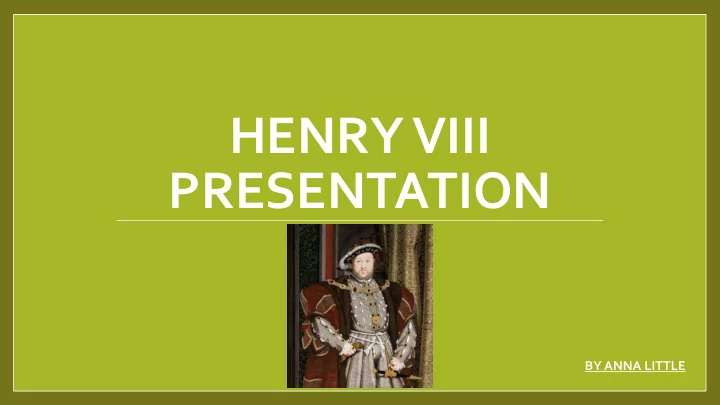

HENRY VIII PRESENTATION BY ANNA LITTLE
Henry’s Marriage History • Henry VIII had six wives during his lifetime. • Henry’s six wives were: Catherine of Aragon: 1509-1533 annulled Anne Boleyn: 1533-1536 executed Jane Seymour: 1536-1537 died Anne of Cleves: 1540 Jan-July divorced Catherine Howard: 1540-1542 executed Catherine Parr: 1543-1547 widowed • Henry had 12 children but only 4 survived childbirth.
Henry’s Actions Towards The Churches • Henry viii believed he could maximize the country's wealth by confiscating the Church's assets. During the dissolution of monasteries, many precious books were destroyed, and the number of poor people (who had previously been helped by the church) augmented.
Henry’s Actions On The Continent • Henry VIII is remembered for two major battles: The Battle of the Spurs and the Siege of Boulogne, both in France. • Henry VIII fought many wars, against the French, against the Scots, against the Gaelic lords of Ireland, against rebels in his own realms, even against his traditional allies in the Netherlands. • Henry was spending a lot of money with wars.
Henry’s Death • Henry viii died 28 January 1547 • Henry died in the Palace of Whitehall, London • On January 28, 1547, Henry VIII died and Edward succeeded to the throne. Henry was succeeded by his nine-year-old son, Edward VI.
The Results Of Henry’s Rule Henry's reign was a time of tyranny and executions, but there were changes which can be seen as the start of modern England: • The dissolution of the monasteries caused suffering for ordinary people as these had been places for the poor to seek relief. In the short term this caused the rebellion known as the Pilgrimage of Grace (1536). In the long term it led to the Poor Laws which, 400 years later, led unintentionally to the welfare state - the modern system that helps citizens financially. • Henry VIII used Parliament to pass his laws, which helped to establish the authority of Parliament. • The power of the gentry rose, and the power of the nobles declined. • Although Henry VIII remained a Catholic, the break with Rome eventually turned England into a Protestant country. • Henry built more warships. Some historians regard this as the start of the Royal Navy. • The Act in Restraint of Appeals turned out to be the most important act in the history of England. It said that this realm of England is an Empire i.e. that England was a sovereign state, subject only to its own government. It was therefore the legal beginning of the English nation. • England remained completely legally independent until 1953, when the government signed up to the European Court of Human Rights.
Recommend
More recommend